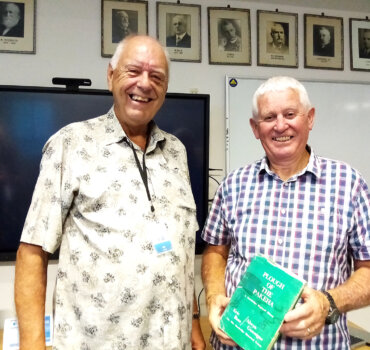
Roger Gordon and Greg Gascoigne (right) at the February Heritage Month talk they hosted. Greg is holding the book co-authored by his father, Alwyn Gascoigne.

Roger Gordon and Greg Gascoigne (right) at the February Heritage Month talk they hosted. Greg is holding the book co-authored by his father, Alwyn Gascoigne.
Cambridge as a town developed at a surprisingly rapid pace.
From 1864, it took little more than a decade for the settlement to grow from a military fort into a bustling town complete with the road layout we see today, banks, churches, shops, saleyards and even a fledgling racing industry. In much the same era, many of the families whose names remain recognisable settled in the area – Heaphy, Clare, Arnold, Reynolds, Fisher and Buckland.
Those early years were outlined earlier this month at a meeting held on behalf of the Cambridge Historical Society and Waipā District Libraries and organised as part of Heritage Month 2021, when talks, walks and workshops were arranged to celebrate the area’s history. Much of the February 9 talk was based on the book, ‘The Plough of the Pakeha’, penned by Eric Beer and Alwyn Gascoigne and focusing on the years 1864-1874. Breathing life into their stories was Waipā District Councillor Roger Gordon and Alwyn’s son, farmer and Rotarian, Greg Gascoigne.
Greg said the book’s authors grew up in early Cambridge and ended up farming together in the Norwegian Rd area of Roto-o-Rangi. “It took 15 years for them to put the book together, mainly from old newspaper cuttings and files Eric gathered together and my dad had to make sense of,” he said.
Greg echoed his father’s view on the past: “If you don’t know your history, you don’t know where you’re headed”. Copies of the book are available at the library.
In outlining the book’s background, Roger said Cambridge had developed at some speed. The site was chosen because it had a small, safe harbour, it was defendable, and it was at the end of the easily navigable reaches of the Waikato River. The first European settlers arrived in 1864, most of them members of the 3rd Waikato Militia attracted to the offer of remaining in the military for three years so as to secure for themselves a one-acre section in town and 50 acres in the country.
“No man was over 40, and they came from all over New Zealand,” said Roger. “Those who came from Australia, and even Europe, were given free passage.”
A survey of the town was done in August 1864, with 400 one-acre sections surveyed on each side of the river. By that year, the population had reached 1000, mostly military men and their families. Much of the town’s layout we know today was drawn up then.
Trade started, bars and stores were established, churches were opened, a small hospital was built, timber houses sprung up, schools started and the BNZ bank took root – the business and social fabric of the town was bedding in. A first race meeting was held in early 1865, the Native Land Court was established a year later. As militia men came to the end of their contracts, some left and were replaced by new settlers. The first agricultural show in Waikato was held in 1872, and a thoroughbred breeding industry started about six years later.
“Those early years of Cambridge were incredible,” said Roger. “There were some insightful and progressive people settling here. We have much to thank them for.”








